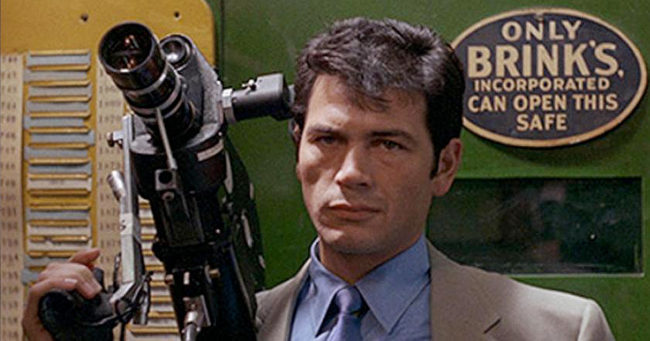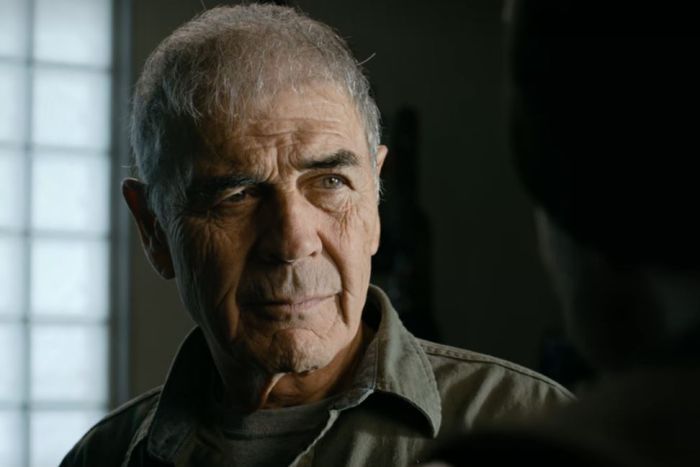So just this afternoon, I got a note from one of my oldest friends who, like so many others, woke up very early this morning in order to go on Netflix and watch “El Camino: A Breaking Bad Movie,” the eagerly awaited feature film spinoff to the series. His message: “So Robert Forster maybe moving up the list of my favorite actors even though I have only seen him in two things. What else is he good in?” My response was to point out that he had almost certainly seen Forster in other films over the years and that yes, he was pretty great after all. Forster was one of those journeymen actors who rarely got the starring roles and who spent a good chunk of his career in weirdo B-movies but who nevertheless enlivened virtually every project that he was involved in with his charismatic presence and range. The epitome of the journeyman actor, Forster was a favorite of filmmakers and moviegoers alike and it therefore came as a massive shock to learn that on the very same day as the premiere of “El Camino,” he passed away in Los Angeles at the age of 78 from brain cancer.
Born in Rochester, New York in 1941—his father was an elephant trainer for the Ringling Brothers and Barnum & Bailey Circus—Forster attended college at the University of Rochester as a history and psychology major with plans of going on to eventually become a lawyer. In the hopes of impressing a fellow student that he wanted to talk to, he auditioned for the school’s production of “Bye Bye Birdie,” landed a part in the chorus and soon caught the acting bug for good. (He also lucked out with the student, June Provenzano, and the two were married from 1966 to 1975). After graduation, he did some theater work in Rochester and eventually made his way to Hollywood.
Unlike a lot of starting actors, who start off in obscurity and work their way up to more notable parts, Forster kicked off his film career on as high of a note as one could imagine—a film directed by John Huston and co-starring two of the biggest actors in the world at the time, Marlon Brando and Elizabeth Taylor. Based on the novel of the same name by Carson McCullers, “Reflections in a Golden Eye” (1967) was a strange psychological drama about repressed sexuality set on an Army base in the South in which Forster played a young soldier who became the object of erotic fixation for both his commanding officer and the officer’s wife. Although the film has undergone a critical appraisal in recent years, both for Huston’s offbeat handling of the material and the way that it dealt with subject matter that would have been utterly taboo for a film just a few years earlier, it was poorly received by critics and tanked at the box office when it came out.

Perhaps if the film had succeeded, Forster might have been launched towards conventional movie stardom. While he worked steadily, his career path veered off in odder directions. He was the star of “Medium Cool,” Haskell Wexler’s groundbreaking and critically acclaimed 1969 drama in which he played a disaffected news cameraman who soon becomes radicalized and eventually finds himself caught up in the middle of the riots during the 1968 Democratic National Convention in Chicago. For the next couple of decades, he bounced back and forth between guest shots on any number of television shows, occasional supporting parts in studio projects like “The Don is Dead” (1973) and “The Black Hole” (1979), Disney’s bizarre attempt to cash in on the success of “Star Wars,” and bigger parts in cheaper B-movies. And yet, no matter what the part, Forster brought a sense of solid professionalism to his work that often stood out against the silliness of the likes of “Alligator” (1980) or the immortal “The Kinky Coaches and the Pom-Pom Pussycats” (1981).
Take a film like “Vigilante” (1982), for example. On the surface, it was just another “Death Wish” clone—he plays a man who joins a vigilante group to get the punks who murdered his wife and son when the courts let him down—but unlike most such films, he lets you get a genuine sense of the rage and anguish that his character is going through instead of simply turning him into a simplistic avenging angel. Likewise, while his casting in “The Delta Force” as the leader of a terrorist group that takes an airliner and its passengers hostage might seem a bit questionable today, his performance certainly wasn’t, thanks to how he fleshed out the potentially cardboard character into something more human and therefore more terrifying. These might have been B-movies at their core but Forster always delivered A-performances.
One person who clearly noticed this was Quentin Tarantino and when he chose to make “Jackie Brown” (1997), an adaptation of Elmore Leonard’s Rum Punch, into his eagerly awaited follow-up to “Pulp Fiction,” he surprised many by casting Forster in the plum role of Max Cherry, a laconic bail bondsman who join forces with an airline stewardess (Pam Grier) to help her get out of a jam involving federal agents, an arms dealer who wants her dead and a half million dollars. Casting the likes of Grier and Forster in the leads was a gamble on Tarantino’s part and one that paid off beautifully in the end. With the exception of “Once Upon a Time … in Hollywood,” the film is Tarantino’s best and most mature work and while Grier got most of the hype, it was Forster’s performance that proved to be the heart of the whole enterprise. Whether taking effortlessly to the tasty dialogue or conveying an enormous range of emotions simply by sitting and listening to the Delfonics singing “Didn’t I (Blow Your Mind This Time),” he was simply magnetic and in the long list of great performances featured in Tarantino films, his deserve a place right at the top. His work even earned him an Oscar nomination for Best Supporting Actor.

He played the Simon Oakland part in the remake of “Psycho” (1998), showed a flair for comedy in “Me Myself and Irene” (2000) and “Human Nature” (2001) and was very moving as a grieving father in the award-winning “The Descendants” (2011). David Lynch cast him as a detective in the pilot for his proposed television series “Mulholland Drive” (2001) and while those plans were scrapped, Forster does appear, albeit briefly, in the acclaimed feature film that it developed into. Years later, Lynch would hire Forster to appear as Sheriff Frank Truman, the brother of the ailing Harry, in “Twin Peaks: The Return.” He appeared in a number of other television shows during this time as well, including “Heroes” and “Breaking Bad,” where his appearance earned him a Saturn Award for Best Guest Staring Role on Television.
If I had to single out one of his post-“Jackie Brown” roles, however, I would probably go with his work in “Diamond Men” (2000). In that indie film from writer/director Dan Cohen, he plays a recently widowed traveling diamond salesman who, following a heart attack, is about to be phased out of the job he has had for thirty years and whose last task is to train his callow young replacement (Donnie Wahlberg). This is a film that constantly surprises the viewer and a lot of that is due to Forster’s strong and steady work—as he did in “Jackie Brown” and in so many other parts, he quietly but effectively gets to the heart of his character and take him and us in surprisingly affecting directions.
With the loss earlier this year of such B-movie icons as Dick Miller and Sid Haig, 2019 was already shaping up to be a terrible year for veteran character actors and the passing of Robert Forster is yet another massive blow. The one compensation is that he left behind so many appearances—186 film and television performances, according to IMDb. Longtime fans and newcomers from “El Camino” can both spend a long time basking in the brilliance of one of Hollywood’s most capable, if underrated, talents.












